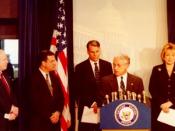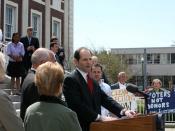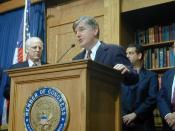Campaign finance reform has always been an issue surrounded by controversy. Though most people agree that the campaign financing process must be amended, little action has been taken in that direction. Among the many obstacles preventing Congress from enacting significant campaign finance reform is the Supreme Court Case of Buckley v. Valeo and soft money.
In 1976 the case of Buckley v Valeo was brought in front of the Supreme Court. Previously under the 1974 law, candidates were limited as to how much money in donations they were allowed to receive. Under the law, a candidate was able to receive a maximum of one thousand dollars from a person in any specific election, receive five thousand dollars form PACs and a maximum amount of money from oneself. In the case Buckley v Valeo, it was argued that by limiting the donation it was violating the candidate's 1st amendment right, freedom of expression.
The Supreme Court decided it was therefore unconstitutional to enforce financing restrictions on candidates. Therefore, the obstacle this case posed to campaign finance reform is that is made it that there must be a constitutional amendment passed in order for there to be restrictions placed on candidates.
A second obstacle to campaign finance reform is soft money. Soft money is donations that are given to the political parties that are not regulated by the government. This money however, is not allowed to be used for direct campaigning for a specific candidate, but for aiding candidates indirectly, such as for party activities. The problem posed by soft money is that both the Republicans and Democrats like soft money. Since both parties find it advantageous, Congress has little incentive to change it.
Though the need for campaign finance reform is perceived it is unlikely that laws regulating it will...



Campaign Finance Reform
Links to watch the daily changes on this topic and get more information-
http://www.campaignfinance.org/
htt p://www.epn.org/issues/campaignfinance.html
http: //www.campaign-reform.org/
5 out of 5 people found this comment useful.